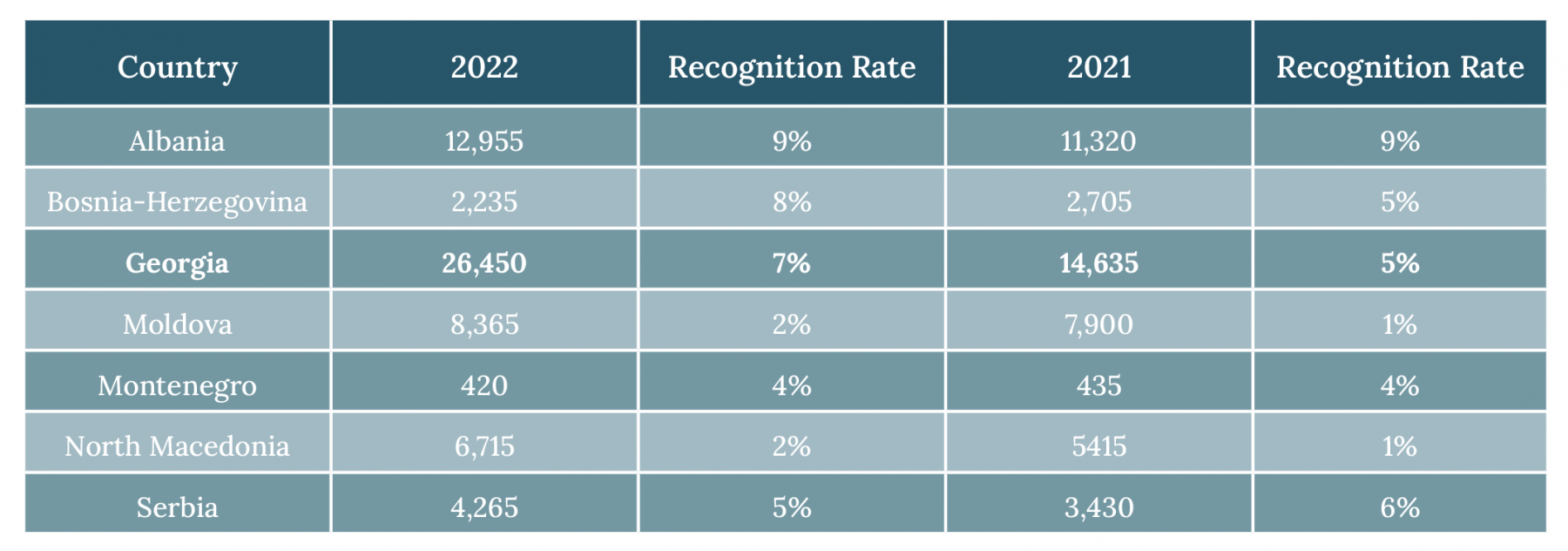To Suspend or Not to Suspend?

Sixty countries around the world benefit from visa-free travel to the EU. Georgia is one of them. The European Union made one of the best decisions regarding Georgia in 2017 - scrapping short-term visa requirements, which resulted in more than 1 million Georgians benefiting from visa-free travel in the last seven years.
Georgia is the only country in the South Caucasus that enjoys this privilege. However, visa liberalization comes with responsibility, and the government has to be loyal to European values, protect human rights and democracy, and not backtrack on the EU path. The visa liberalization process is conditional, and the country willing to get it needs to fulfill the visa liberalization action plan (VLAP). It took Georgia more than three years to fulfill VLAP requirements, including fighting against discrimination, protecting personal data, respecting human rights, and tackling high-level corruption.
The EU regulation 2018/1806 sets the process of visa-free travel. The Commission is tasked to “report regularly to the European Parliament and the Council, at least once a year, for seven years after the date of entry into force of visa liberalization for that third country, and after that whenever the Commission considers it to be necessary or upon request by the European Parliament or by the Council.” Visa liberalization is not granted eternally. The EU keeps the right to suspend it based on the following grounds:
- There is a substantial increase (more than 50%) in the number of people arriving irregularly from visa-free countries, including people found to be staying irregularly and persons refused entry at the border;
- The substantial increase (more than 50%) in the number of asylum applications from countries with low recognition rates (around 3-4%);
- Decline in cooperation on readmission;
- Increased risk to the security of Member State;
- Non-compliance with the specific requirements to assess the appropriateness of granting visa liberalization.
In addition, the European Union is now considering extending the grounds that would entail a third country's lack of alignment with the EU's visa policy in cases where this may lead to increased arrivals to the EU, investor citizenship schemes, and hybrid threats.
The European Union sees the visa liberalization suspension mechanism as a tool of the last resort. Only once has the EU halted visa-free travel. This was the case with Vanuatu, a small island in the South Pacific Ocean with around 300,000 people. The decision was made due to the risks posed by Vanuatu’s investor citizenship schemes (so-called ‘golden passport’ schemes).
The suspension mechanism allows Member States to notify circumstances leading to a possible suspension and for the Commission to trigger the suspension mechanism on its initiative. However, before taking that decision, the European Commission needs to consider the situation of human rights in that third country and the possible consequences of visa suspension. The duration of the visa suspension could initially be up to nine months, with the possibility of being extended up to 18 months and then entirely scrapped. Notably, the suspension could be applied to specific categories of nationals of the third country concerned.
Russian Law vs. Visa-Free Travel
The number of Georgians migrating to the EU and staying there as illegal migrants or seeking official asylum has increased in recent years. Most of these migrants are fleeing poverty and seeking a better life in the EU. The media occasionally reported that some EU member states, unhappy with the increased migration from Georgia, even raised the possibility of triggering the visa liberalization suspension mechanism.
When deciding whether to suspend visa-free visas with a third country, two aspects are considered: technical data and political choice.
When deciding whether to suspend visa-free visas with a third country, two aspects are considered: technical data and political choice. The technical details of Georgia's case do not look good. Despite the low recognition rate (7%), the number of Georgian asylum seekers in the EU and Schengen zone countries was the highest as compared to Ukraine, Moldova, and the Western Balkan countries. According to the 2023 report of the EU Agency for Asylum - Georgian citizens were in the top eight countries of origin in 2022 (after Syria, Afghanistan, Türkiye, Venezuela, Colombia, Pakistan, and Bangladesh) seeking asylum (first-time asylum seekers) in the EU and Schengen zone. Overall, 26,450 Georgian citizens asked for asylum in the Schengen countries in 2022.

According to the latest data, the number of first-time asylum seekers from Georgia to the EU and Schengen zone countries slightly dropped to 21,805 in 2023. However, Georgian citizens, together with the citizens of Syria, Afghanistan, Türkiye, Venezuela, Colombia, Bangladesh, Pakistan, Morocco, Egypt, Peru, and Iraq, are among the top 12 countries of origin seeking asylum.
The latest development linked to the adoption of the Russian-style law on foreign influence and the so-called "anti-LGBTQI" law dramatically changed the reality on the ground.
In the last report issued in October 2023 under the visa suspension mechanism, the EU praised Georgia for cooperating closely with Member States on readmission. The rate of positive decisions by the Georgian authorities on readmission requests averaged 98% for 2017-2022. However, the latest development linked to the adoption of the Russian-style law on foreign influence and the so-called "anti-LGBTQI" law dramatically changed the reality on the ground. The laws demonstrated backtracking on visa liberalization action plan requirements, particularly related to protecting personal data, human rights, and equality.
In response to the latest political development and the Georgian Dream’s attempt to derail Georgia from the European and Euro-Atlantic Integration path, the European Parliament adopted the resolution in April 2024, which called on the European Commission “to promptly assess the impact of Georgia's planned 'foreign agent' law on Georgia's continuous fulfillment of the visa liberalization benchmarks, particularly the fundamental rights benchmark, a crucial component of the EU visa liberalization policy.”
The EU member states broadly share the European Parliament's standing. As the EU Ambassador to Georgia, Paweł Herczyński, put it - the EU is ready to consider "all options" that can be introduced towards Georgia due to adopting the foreign agent’s law, including the suspension of visa liberalization.
What kept Georgia from being suspended from the visa-free scheme before was not the country’s excellent performance and good benchmarks but its political closeness with the EU. Once the political umbilical cord is cut, only technicalities will speak against the Georgian case, thereby making the visa suspension more likely.
How the Suspension Works
The European Commission is empowered to trigger the visa suspension mechanism. It can do that by following the examination of a notification from the EU member states or its own analysis. Triggering the suspension procedure can be done automatically when a simple majority of EU member states notifies the European Commission regarding the existence of one or more of the previously mentioned five grounds.
the risk that Georgia might face the harsh reality of potentially losing the most tangible benefit of EU integration - visa-free travel - is becoming increasingly realistic.
Considering that a simple majority is required for the decision, the long-standing partner of the ruling Georgian Dream party, the Hungarian government, would be unable to block the decision-making process. Thus, the risk that Georgia might face the harsh reality of potentially losing the most tangible benefit of EU integration - visa-free travel - is becoming increasingly realistic.
The GD would quickly use the suspension to promote propaganda that the European Union punishes ordinary people, thus stirring even more anti-European sentiments.
However, the European Commission and many member states view scrapping visa-free travel as a double-edged sword. On the one hand, this could be yet another and the clearest signal to the ruling Georgian Dream that it has to pay a price for derailing the country from the EU track and not respecting the choice of its people. On the other hand, however, it will negatively affect ordinary citizens. The GD would quickly use the suspension to promote propaganda that the European Union punishes ordinary people, thus stirring even more anti-European sentiments. According to the Georgian Dream, Europe already wants to drag Georgia into the war (the global war party narrative), is supporting coup d’état attempts through civil society (sovereign democracy narrative), and is imposing immoral values (gay propaganda narrative) on Georgia. In addition to this, the suspension of visa-free travel and anti-European sentiments might skyrocket. What would augment the problem is that the EU will need to engage in a detailed explanation of this decision, which it probably won’t do; even if the Commission decides to communicate its message correctly, it will fail to compete with the potent propaganda narratives of the Georgian Dream.
When considering the activation of the visa-suspension mechanism, the EU should also think about the civil society activists in Georgia who are facing physical threats and live under state-backed terror. Suspension of the visa-free travel would lock them in the country. They would not have the opportunity to leave Georgia in case of the repressions already announced by the GD leader Bidzina Ivanishvili in his public speech on 29 April 2024.
Making the political decision to scrap visa-free travel four months before the election is risky.
Making the political decision to scrap visa-free travel four months before the election is risky. On the one hand, it might be interpreted by the ruling Georgian Dream party-affiliated propagandistic media as if the EU is interfering in Georgia's domestic affairs to make the voters angry to vote against the GD. However, at the same time, this could be yet again a direct signal to the Georgian people from Brussels that this is the GD that stands between the EU and their aspiration to join the club. This would be a powerful signal to young voters (up to 300,000 between the ages of 18-24) who go against the Russian law, enjoy visa-free mobility the most, and regularly travel to the EU and Schengen zone countries.
